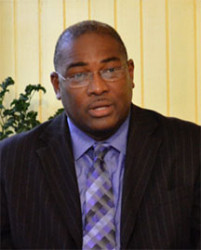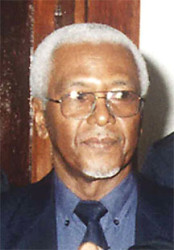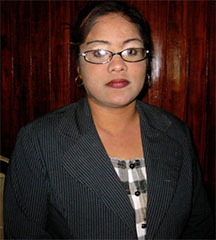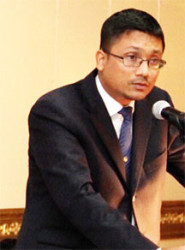A steering committee has been appointed to lay the groundwork for a new constitutional reform process.
Attorney Nigel Hughes has been named the convener of the committee, which also comprises attorneys Gino Persaud and Geeta Chandan-Edmond, Professor Harold Lutchman and constitution expert Haslyn Parris.
During a briefing on the work of the committee on Thursday at the Office of the Prime Minister, Attorney-General Basil Williams said it would have four months to complete its work from September 1st.
Its work would entail formulating proposals on the manner, nature and conduct of the constitutional reform process.


The steering committee, Williams added, will have to determine the parameters of the constitutional reform. Asked about priority areas, Williams said he did not want to preempt the steering committee but noted that constitutional reform was a “major plank” in the government’s elections campaign and areas highlighted included the presidency, governance and the term limits. With regards to the latter, he said that although it is addressed in the constitution, “you see the difficulty you are having with it now in terms of interpretation.”
Last month, acting Chief Justice Ian Chang ruled that the presidential term-limit, which was put in place through an amendment to the constitution approved by a two-thirds majority of the members of the National Assembly, was unconstitutional without the approval of the people through a referendum.
Prime Minister Moses Nagamootoo, who chairs a Cabinet sub-committee on parliamentary affairs, emphasised that the steering committee would not be responsible for formulating the reforms, only the modalities and the terms of reference of the broader Constitu-tional Reform Commission.
Whatever recommendations are made, Nagamootoo said, will have to be taken to the Cabinet sub-committee on parliamentary affairs and then subsequently cabinet will be briefed.


“I don’t think the opposition [PPP/C] would be right to perceive that they could be left out of the process because this is not in fact the constitutional reform process. This is the preparatory stage to define the scope of the work as well as certain timeframes and modalities… the opposition parties and civil society, I am sure, will be fully involved in the work of the Constitutional Reform Commission,” he added.
Williams was asked whether there is a plan in place in the event that the opposition PPP/C does not support the proposed constitutional reforms. With a two-thirds majority of members of the National Assembly needed to alter the constitution, the PPP/C’s support would be crucial Williams pointed out that while the reforms could also be effected through a majority vote at a referendum, no decision in this regard has been taken.
At the conclusion of the steering committee’s work, he said, “we will have an idea by that time of the shape of the constitutional reform process and the matter of execution, whether… should we entertain a referendum, should we look to the parliamentary process, which would require two-thirds majority… and of course certainly would require the signing on by the main opposition party,” he said.
Williams was, however, hopeful that government will not be faced with the politicising of the referendum process, if one is to occur. “I think all would welcome constitutional reform… because, as you know, we have a constitution that has a lot of incomplete and inchoate matters that need to be resolved and that is what the steering committee also has to deal with,” he said, while also noting that a standing parliamentary committee for constitutional reform has been unable to making any headway on the reform front.
Nagamootoo said the government is not interested in an “unending” process, although he noted that as a “living thing” the constitution should be periodically reviewed.
“We don’t want an unending process. We want to be able to set up some time limits and to decide on the issue of the form of any commission’s work,” he said.
“But going forward, I don’t anticipate that this would be the end all and be all of constitutional reform. The constitution is quite a living thing and it ought to be subjected to periodic review and, if necessary, changes and reforms to suit evolving political and other conditions,” he added.
Hughes, in brief comments, said the members of the steering committee had an opportunity to take advantage of the institutional knowledge they have of the constitutional reform process. He said that his role as the convener is to try to efficiently facilitate the process.




